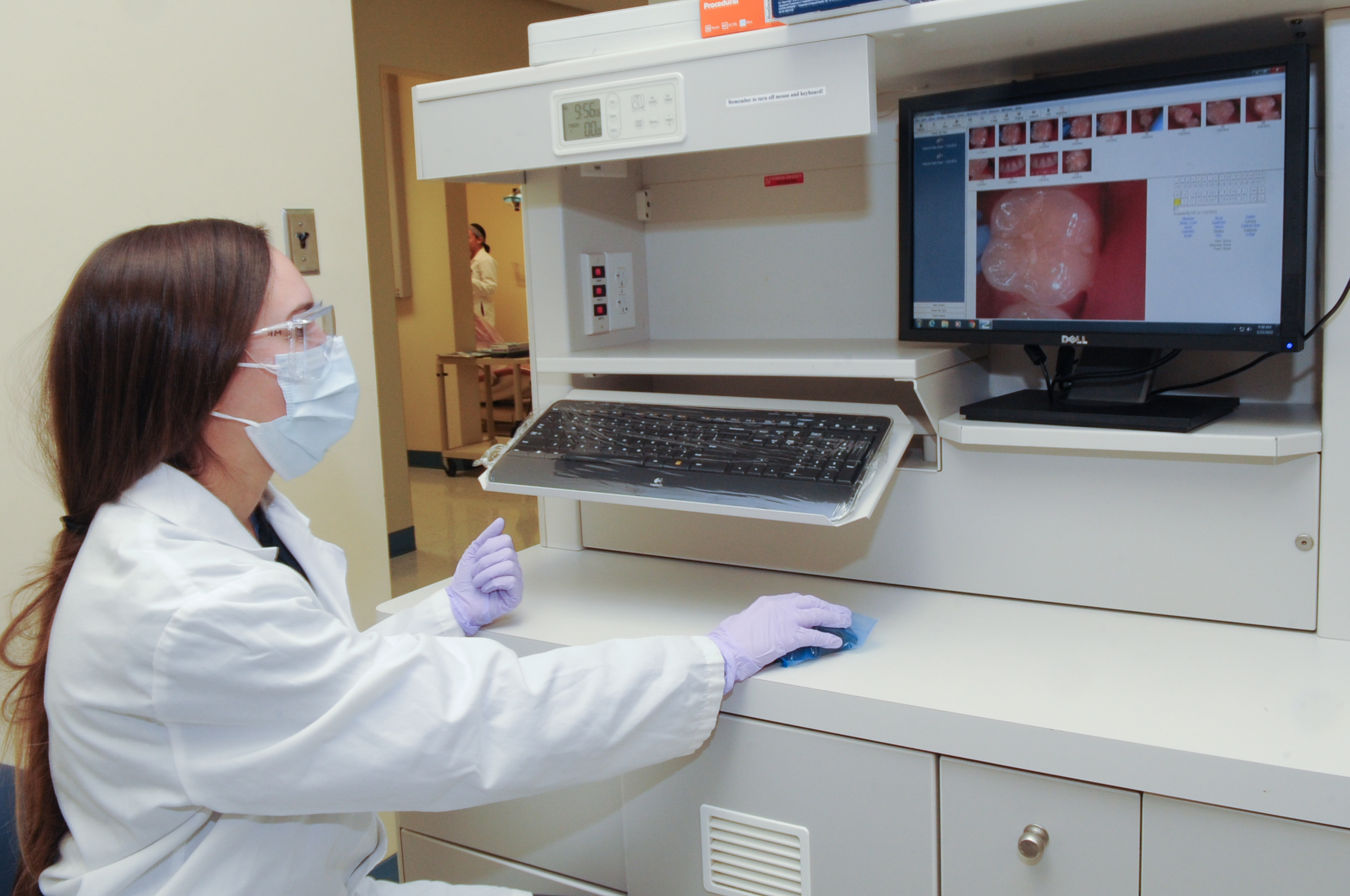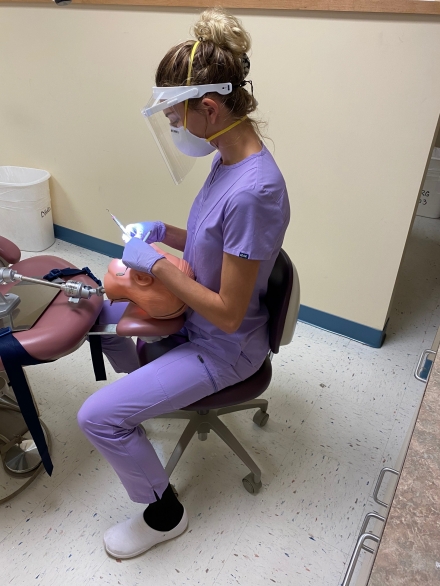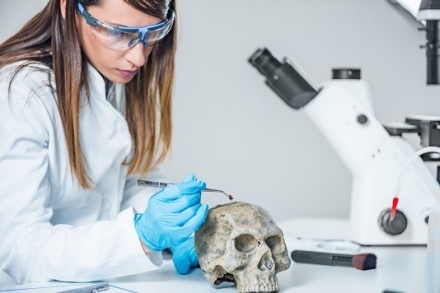Old Dominion University is a center of learning committed to the principle of free inquiry through research, scholarly endeavors and creative undertakings by faculty and students. The 188-acre main campus of the university is a state-assisted, doctoral research institution located in Norfolk, Virginia. The Dental Hygiene Research Center (DHRC) is a stand alone facility housed with the School of Dental Hygiene.
The Center has established successful collaborations with other academic institutions, pharmaceutical companies, healthcare facilities, industry, the community, and private practice.
The DHRC plays a key role in exposing both undergraduate and graduate students to research activities, which contributes to the student's understanding of the link between theory and practice. The Center provides designated clinical and laboratory space for conducting a broad range of research projects.
The faculty of the Gene W. Hirschfeld School of Dental Hygiene is committed to the preparation of dental hygienists for leadership roles in today's healthcare system, research, education and industry. Toward this end, it offers innovative curricula leading to master's degree in dental hygiene. Opportunities for doctoral research also are available.
Mission Statement
The ODU Dental Hygiene Research Center (DHRC) is dedicated to conducting high-quality, clinical, and population-based research to explore diagnosis, pathogenesis, and treatment of conditions that are related to overall health. The Center, officially sanctioned by the University in 2000, is the first worldwide facility dedicated solely to dental hygiene research. The Center strives to advance oral and general health through interdisciplinary and multidisciplinary research in collaboration with other disciplines, academic institutions, medical facilities, industry, and the community.
The Center represents a dental hygiene research paradigm, unique for undergraduate and graduate education because currently no other dental hygiene program has such a facility. Research is an integral and essential component of the School of Dental Hygiene's educational mission whereby students experience the link between theory and practice.Students and faculty work collaboratively to create new knowledge through discovery, application of evidence-based knowledge, and dissemination of knowledge through scholarly publications and presentations.
The DHRC provides designated clinical and laboratory space which centers around the development of safe, effective measures to prevent and treat common oral conditions; expand knowledge of occupational risk assessment and ergonomic issues related to the practice of dental hygiene and other health care professionals; expand knowledge related to dental techniques, products, and devices; and explore the relationship between oral and systemic health.
Overview
The Translational Research Working Group (TRWG) defines Translational Research in the following way:
"The Translational research transforms scientific discoveries arising from laboratory, clinical, or population studies into clinical applications to reduce cancer incidence, morbidity and mortality."
Definition of Translational Research
Source: http://www.cancer.gov/trwg/TRWG-definition-and-TR-continuum
Training in Responsible Conduct of Research at ODU
Old Dominion University has a policy of training all graduate students in the fundamentals of Responsible Conduct of Research (RCR). This policy was adopted with the understanding that the knowledge and philosophy presented in the RCR training can enhance the professional development of all students, regardless of discipline. The following requirement is presented on page 57of the Graduate Catalog:
All graduate students must complete the Collaborative Institutional Training Initiative (CITI) seven core RCR training modules. These modules address the following: Misconduct (falsification, fabrication and plagiarism); Data acquisition, management, sharing and ownership; mentor/trainee relationship; Publication practices and responsible authorship; Peer review; Conflicts of interest; and, Collaborative research. Completion of the RCR modules will be tracked through the CITI website and must be completed within twelve months after first enrolling.
Singapore Statement on Research Integrity
College of Health Sciences Human Subjects Research
Protecting Personal Health Information in Research: Understanding the HIPAA Privacy Rule
Guidelines for Authorship and Acknowledgments
Publishing and Presentation Resources
Old Dominion University (ODU) Library
National Institutes of Health (NIH)
American Dental Hygienists' Association (ADHA) Research
ODU Office of Research: Compliance Forms
Volunteer Resource Information: ClinicalTrials.gov and ClinicalTrials.com
Journal of Dental Hygiene: Author Guidelines
National Science Foundation (NSF) 2008 Proposal Guide
The ODU Office of Research funding source: Student Funding for ODU Ph.D. Programs, which includes external funding for dissertation research, training and fellowships for graduate students. Click here for details.
Since the Dental Hygiene Research Center (DHRC) at Old Dominion University was officially designated as the first facility of its kind, research activities continue to be an integral part of everyday life at the school. Students have the opportunity to work collaboratively with experienced research faculty in developing research skills. Some of the exciting research activities include:
Taylor Kace, graduate student in the MSDH program is currently working on a project titled: THE EFFECTS OF STANDING AND SITTING HYGIENE ON POSTURE IN DENTAL HYGIENE STUDENTS. This research explores the impacts of sitting and standing postures to deliver dental hygiene services. This research aims to identify ergonomic advantages and risks to both postures in an effort to reduce musculoskeletal disorder burdens on dental hygienists.
Samantha Vest, graduate students working on a project titled: Disaster Victim identification Competencies: a comparison of dental hygiene and dental assisting students. This study looks at the perception of knowledge and level of skills of senior dental hygiene and senior dental assisting students on the topic of disaster victim identification and it's use during mass fatality.
Kimmie Cenzon, graduate student working on a project titled: Use of an Innovative Simulated Virtual Training (SVT) to Improve Dental Hygiene Students' Self-Reported Knowledge, Attitudes, and Confidence in Providing Care to Child Patients with ASD: A Pilot Study;With an increased prevalence and early diagnosis of Autism Spectrum Disorder (ASD), it is increasingly important for dental hygiene students to be knowledgeable and comfortable in providing care to children with ASD. Creating experiential learning, or simulated training opportunities for dental hygiene students is warranted to ensure competence and confidence in providing care for ASD patient post-program completion. This study aims to assess if a simulated virtual training (SVT) improves dental hygiene students' self-reported knowledge, attitudes, and perceived confidence to provide care for child patients with ASD. This study was selected as a recipient for the American Dental Hygienists Association Institute for Oral Health General Research Grant.






